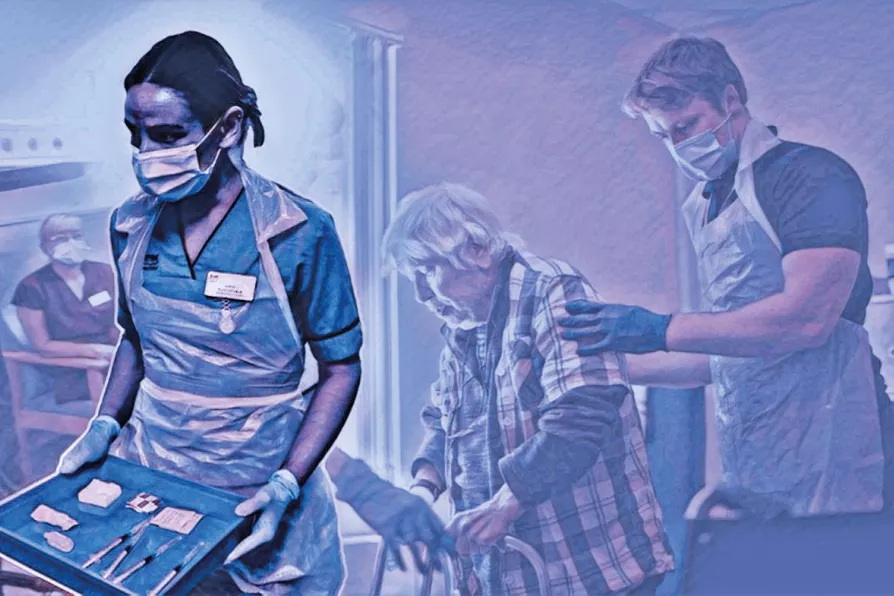Hundreds protested against the US-Israel attacks on Iran in Parliament Square on Saturday, fearing a wider conflagration and horrified by the targeting of young schoolchildren, writes LINDA PENTZ GUNTER
From the ‘marketisation’ of care services to the closure of cultural venues and criminalisation of youth, a new Red Paper reveals how austerity has weakened communities and disproportionately harmed the most vulnerable, write PAULINE BRYAN and VINCE MILLS


KEEP LEFT: Red Paper on Scotland 2025 marks the 50th anniversary of the original Red Paper on Scotland. Many of the issues facing us today were set in motion at the very time when Gordon Brown, then a young radical, edited the Red Paper on Scotland in 1975.
The current edition looks at many aspects of Scotland in 2025 but perhaps one of the most important is: what kind of country is Scotland?
Where better to start than by considering social care. Both Sarah Cowan and Susan Galloway provide serious analysis of how Scotland has dealt with this issue. From an unapologetic feminist perspective Cowan not only points that women continue to bear the brunt of caring in our society, she goes on to argue that transformation requires its feminisation: “With concerted effort an economy that works for women and men is possible. Recognising, valuing and investing in care is a critical element to deliver the changes that women need to see and redressing the balance in the current economic system. A gender-equal economy will be one that works better for everybody, especially those who currently face the sharp end of economic inequality.”
Galloway focuses on the “marketisation” of care and how this has failed care recipients and care workers alike. Referring to the National Care Service (Scotland) Bill as introduced in 2021, she writes: “The care system was already broken but Covid made the crisis impossible to ignore. The response from the Scottish government was not to turn away from market mechanisms to a greater focus on community control. Quite the reverse. It was a legislative proposal seeking not just centralisation, but to get rid of the concept of ‘in-house’ services entirely.”
But Galloway goes further, describing the context of the crisis in social care: “Austerity has undermined many of the local institutions that bind our communities together. Cuts to our libraries, community learning, youth work, day centres and grants to voluntary organisations have all weakened local communities. These cuts adversely and acutely impact the most disadvantaged individuals, communities, and groups.”
Unsurprisingly, as Susan Morrison points out, this has also impoverished culture in Scotland: “But right now young performers and artists are being denied places to learn and grow… All over Scotland live music venues are closing. Communities are trying to take halls and small theatres into local ownership, just to keep the stages open for performers, but the bell keeps tolling the same dull message — there is no money.”
This is indeed tragic as some of the youngsters considered by Gavin Brewer may have avoided being criminalised, even if they were unable to find work, had there been a thriving local cultural scene they could have accessed: “… with a sharp decline in demand for heavy industry from the first decade of the 20th century, and a mismanaged and ‘reckless’ deindustrialisation from the 1970s, the crime and criminalisation of such youth cultures did not occur as coincidence but as a direct consequence of poverty and inequality.”
The book covers much more than the social impact of change in Scotland, including the economy, the constitution, local government and much more. The answer to what kind of country Scotland has become is one that does not serve the needs of its people. The book not only describes that but offers a road to change.
Keep Left: Red Paper on Scotland 2025 is available from Luath Press (luath.co.uk).

From hunting rare pamphlets at book sales to online panels and courses on trade unionism and class politics, the MML continues connecting archive treasures with the movements fighting for a better world, writes director MEIRIAN JUMP

On the release of her memoir that reveals everything except politics, Sturgeon’s endless media coverage has focused on her panic attacks, sexuality and personal tragedies while ignoring her government’s many failures, writes PAULINE BRYAN

That Scotland was an active participant and beneficiary of colonialism and slavery is not a question of blame games and guilt peddling, but a crucial fact assessing the class nature of the questions of devolution and independence, writes VINCE MILLS

As Reform UK threatens to capitalise on public anger, our Establishment politicians simply refuse to acknowledge their role in creating the very alienation that gives succour to Farage, writes CRAIG ANDERSON










